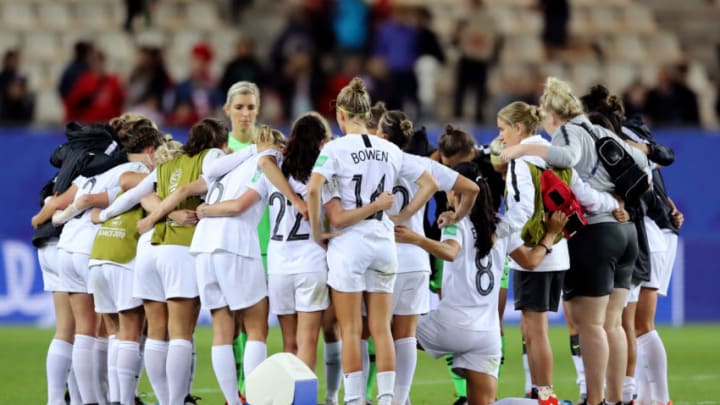Chelsea FCW’s Ali Riley denied Canada any use of New Zealand’s left side
By George Perry

Canada had near-complete control of their group stage match against New Zealand. One of the few accommodations they had to make was avoiding Chelsea FC Women’s Ali Riley in the second half.
Further demonstrating the emptiness of possession to describe anything useful about a football match, Canada’s 70% possession against New Zealand vastly understates their control over the run of play and how far New Zealand was from giving themselves even a toehold in the game. The 2-0 scoreline is only slightly less muted in what it says about the match. Canada had 10 more shots (24) than New Zealand had passes in the final third. But since Canada only put six on target (the Football Ferns had two shots, neither on target), the score and the defeated maintain respectability.
New Zealand, though, at least had control of one side of the game: their left. Chelsea FC Women’s full-back Ali Riley tightly tracked and marked Canada’s forwards on her side, Nichelle Prince and Jayde Riviere, effectively taking them out of the first half.
Riley took her cues off of Prince’s movement, staying close to her until the Kiwi centre-backs picked Prince up more centrally. This would bring Riviere into Riley’s crosshairs, who marked her just as closely.
Riley was sufficiently proactive in closing down both players that she rarely had a true one-on-one battle with them. Canada would see how little room they had to receive a pass, and would therefore send the ball towards any of their many other options. Canada were never able to drag Riley towards one player while leaving the other open, nor did they successfully overload Riley 2v1 or 3v1. They played those options on their left, where New Zealand had to make a change at right-back in the 18′.
In the second half, Canada barely bothered using their right side. They sent nearly all attacks and all passing sequences through the left, and only cycled the ball as far as the centre of the pitch.
New Zealand brought on an additional defender in the 62′, shifting to somewhat of a 3-5-2 with Ali Riley as the wing-back. The extra centre-back gave New Zealand better control of Canada’s two strikers, who now both stayed more towards the centre of the pitch to overload the centre-backs and – to some extent – escape Riley’s pocket.
This brought Riley slightly up the field, defending the triangle between Canada’s midfielders and winger rather than marking the forwards.
As a result of this new position, the build-up to Canada’s second goal perfectly circumvented Riley. Riley had her player well-covered for any passes into the box. The Canadian laid the pass to Christine Sinclair just outside the box. Her marker did not close her quickly enough as Riley fell back to cover the return pass, allowing Sinclair to send a cross to the far post which – after a deflection and rebound – went in the net.
Canada’s shot map is a remarkable testament to how well Ali Riley silenced Canada’s forwards. Only three of Canada’s 24 shots came from the left of New Zealand’s goal. None were on target and two were from outside the box.
New Zealand are still looking for their first ever win in the Women’s World Cup. Their final group stage game is against Cameroon. Before the tournament, Riley knew breaking the duck could come down to that game.
"Cameroon is the must-win, they’re ranked lower than us and with the type of fixtures and results we’ve been getting recently, it’s a game we’ve got to win. – Chelsea FC"
dark. Next. Chelsea are cornering themselves with two-year extensions
A win with a large goal differential could give New Zealand a distant chance of advancing into the knockout rounds. So far, only Chelsea’s English contingent – Fran Kirby, Karen Carney and Carly Telford – have booked their passage.